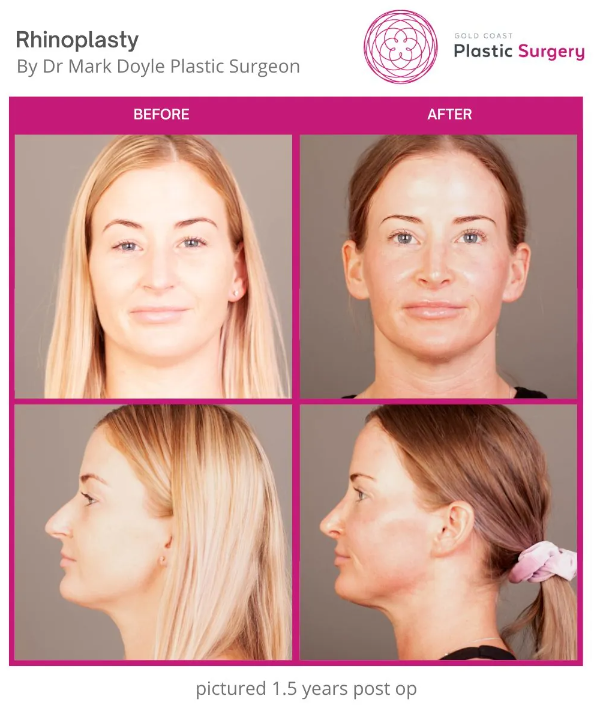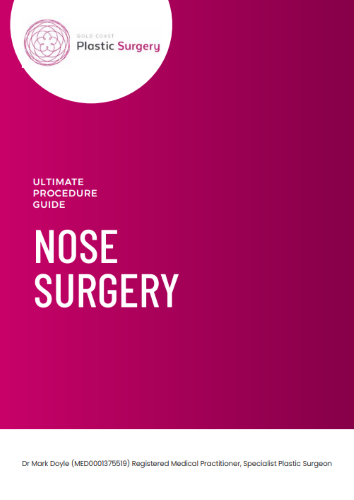Key Takeaways
- Rhinoplasty recovery is crucial for a successful outcome, impacting the results of the surgery.
- Following the recovery timeline and managing swelling, pain, and discomfort are essential during the recovery process.
- Proper nutrition and hydration are vital for optimal healing, with a focus on consuming protein-rich foods and staying hydrated.
- Tip rhinoplasty has a shorter recovery duration and typically involves less extensive nasal modifications compared to full rhinoplasty.
- Adhering to post-operative instructions and maintaining communication with your surgeon are key to ensuring a smooth recovery.
Rhinoplasty surgery, also known as nose job, is a procedure designed to address various nasal issues and improve nasal function. However, the journey doesn’t end after surgery. The rhinoplasty recovery period that follows is equally crucial for ensuring a successful procedure.
Proper rhinoplasty recovery isn’t merely an afterthought; it plays a pivotal role in the outcome you’ll achieve in terms of addressing nasal concerns. This guide will emphasise the importance of rhinoplasty recovery and highlight how it directly influences the success of your procedure. It will provide valuable insights and advice to ensure you can navigate your recovery journey well-informed and achieve the best possible results. Let’s explore why nose job recovery deserves your attention.
Disclaimer: All information on this website is general in nature and is not intended to be medical advice, nor does it constitute a doctor-patient relationship. Results can vary significantly and depend on individual patient circumstances. Please be aware that the outcomes shown are specific to those patients and may not necessarily reflect the results others may experience. Individual results can vary due to many factors, including genetics, diet, and exercise. All images on this website, unless specified as real patient images, are graphics used for illustrative purposes only. Surgery risks and complications will be covered in detail during a consultation with your surgeon. Book a consult for details regarding your cosmetic surgery procedure.
Understanding Rhinoplasty Recovery

Rhinoplasty recovery is a crucial phase after the surgery, impacting the results of your nose job (rhinoplasty). Managing rhinoplasty swelling stages, adhering to recovery timelines, and implementing effective recovery tips are key components of a successful recuperation.
The Rhinoplasty Recovery Timeline

Immediate Post-Op (Days 1-7)
During the first week of your nose job recovery, expect some discomfort and swelling. Managing pain and wound care are vital aspects of this phase. Your surgeon will provide specific guidance on pain relief and post-operative care.
Early Recovery (Weeks 2-4)
As you transition into weeks 2-4 post rhinoplasty, you will notice changes in swelling, bruising, and discomfort. It’s crucial to follow the recommended timeline for resuming light activities. Your body is still adapting, so patience is essential.
Mid to Late Recovery (Weeks 5-12)
In weeks 5-12 of your rhinoplasty recovery, which is a significant part of the nose job recovery time, you will experience a gradual reduction in swelling. This is the period when you can anticipate your results. Continuing to adhere to your surgeon’s instructions is crucial for the long-term outcome.
Rhinoplasty Healing Stages Pictures
In your rhinoplasty journey, visually seeing the rhinoplasty healing stages can be immensely helpful, allowing you to track the transformation from the immediate post-operative period to the final rhinoplasty results.

Rhinoplasty Recovery Tips
Follow Your Surgeon’s Instructions
Strictly adhering to post-operative guidelines is imperative for a successful recovery after rhinoplasty. Your surgeon’s instructions are tailored to optimise your healing process.
Pain Management Strategies
Pain management is essential during your nose job recovery (rhinoplasty recovery). Your surgeon may provide both non-prescription and prescription pain relief options to ensure your comfort.
Swelling and Bruising Reduction Techniques
To reduce swelling and bruising, consider using cold compresses and keeping your head elevated while resting. These techniques can significantly aid in your recovery.
Nutrition and Hydration Essentials
Proper nutrition and hydration are essential for a successful recovery after rhinoplasty. To ensure your body heals optimally and reduces inflammation, consider the following dietary recommendations:
- Eat Foods Rich in Protein and Vitamins: Your body needs essential nutrients to repair and regenerate tissues. Include foods high in protein, such as lean meats, fish, eggs, dairy, and legumes, in your diet. Additionally, prioritise fruits and vegetables rich in vitamins, particularly vitamin C, which promotes healing. These nutrients aid in rhinoplasty healing and enhance your overall health.
- Stay Hydrated with Water and Herbal Teas: Hydration is key to rhinoplasty post op. Drink plenty of water to keep your body well-hydrated, which aids in tissue healing and prevents complications like dry mouth. Herbal teas, such as chamomile or ginger tea, can be soothing and provide additional hydration without caffeine, which can contribute to dehydration.
- Avoid Salty and Processed Foods: High-sodium (salty) and processed foods can lead to increased swelling and water retention. Minimise your intake of these foods during your recovery period to help reduce rhinoplasty swelling and discomfort.
- Consult Your Surgeon for Personalised Advice: Every individual’s dietary needs and recovery process may vary. Therefore, it’s essential to consult your surgeon for personalised dietary advice. Your surgeon can offer guidance tailored to your specific situation, considering any unique dietary restrictions or recommendations based on your surgery.
How Tip Rhinoplasty Recovery Differs
Tip rhinoplasty, a procedure focused on refining the nasal tip, differs in several notable ways from a full rhinoplasty:
- Less Extensive Nasal Work: Tip rhinoplasty typically involves less extensive modification of the nasal structure compared to a full rhinoplasty. The surgical changes are concentrated on the tip, making it a less invasive procedure.
- Shorter Recovery Duration: Due to the reduced surgical scope, tip rhinoplasty often leads to a shorter recovery period compared to a full rhinoplasty. This means that patients may experience less downtime and a quicker return to their daily activities.
- Reduced Initial Swelling and Bruising: Because tip rhinoplasty is less extensive, patients generally experience less initial swelling and bruising.
- Unique Sensations and Discomfort: Despite the milder nature of tip rhinoplasty, patients may still encounter specific sensations and discomfort related to the nasal tip. This can include sensations of tightness or mild tenderness around the tip area as it adjusts to the surgical changes.
It’s important to note that while tip rhinoplasty recovery is typically shorter, it still requires proper post-operative care and adherence to your surgeon’s instructions to ensure optimal results. Always communicate openly with your surgeon about any sensations or concerns during your recovery to ensure a successful outcome.
Tips for Successful Tip Rhinoplasty Recovery
- Follow Post-Operative Instructions Diligently: Adherence to your surgeon’s post-operative instructions is crucial for a smooth recovery.
- Mind Nasal Tip Sensitivity: Be aware of nasal tip sensitivity during recovery, as this area may be more delicate following the procedure.
- Avoid Excessive Pressure: Refrain from applying excessive pressure or touching the nasal tip to prevent potential complications.
- Use Ice Packs and Gentle Massage: To manage swelling, consider using ice packs and gentle massage techniques as advised by your surgeon.
- Maintain Hydration and a Balanced Diet: Stay well-hydrated with water and herbal teas, and ensure your diet includes balanced nutrition, rich in protein and vitamins, for optimal healing.
- Elevate Your Head While Sleeping: Keeping your head elevated, even while sleeping, can help reduce swelling and promote a smoother recovery.
- Be Patient: Understand that final results from tip rhinoplasty may take longer to fully manifest due to subtle changes. Patience is key.
- Communicate with Your Surgeon: Maintain open and clear communication with your surgeon throughout your recovery process. Share any concerns or questions to ensure the best possible outcome.
FAQs
How Long Is Rhinoplasty Recovery?
Rhinoplasty recovery time varies among individuals but typically spans 6 weeks to 3 months. Full healing and visible results may take up to a year.
What Not to Do After Rhinoplasty?
Avoid strenuous activities, including exercise after rhinoplasty, smoking, and alcohol consumption during your recovery. Additionally, refrain from touching or manipulating your nose to ensure proper healing.
Engaging in strenuous activities and exercise too soon can increase the risk of complications, such as excessive swelling after rhinoplasty and bleeding. It’s essential to allow your body the necessary time to heal properly. Your surgeon will provide guidance on when it’s safe to resume exercise and other strenuous activities during your recovery period. Always adhere to recommendations from Dr Doyle to promote a successful nose surgery recovery.
How to Sleep After Rhinoplasty?
To promote a smooth recovery, sleep with your head elevated on several pillows or use a wedge pillow. This helps reduce swelling and minimises pressure on your nose.
Contact Us
If you have further questions regarding recovery time for rhinoplasty or are considering rhinoplasty or tip rhinoplasty, please don’t hesitate to reach out to our experienced team. Schedule a consultation by calling our clinic or enquire through our website.
About Dr Mark Doyle FRACS (Plas) – Queensland Plastic Surgeon
Servicing patients in Gold Coast, Brisbane, Sunshine Coast, Cairns and New South Wales NSW – Northern Rivers, Byron Bay, Ballina, Lismore and more.
Dr Mark Doyle is a fully qualified Specialist Plastic Surgeon with over 30 years of experience performing breast, body, face and nose surgery. He has completed all required training and only carries out approved surgical practices. There are NO undertrained doctors or cosmetic doctors acting as surgeons at Gold Coast Plastic Surgery.


